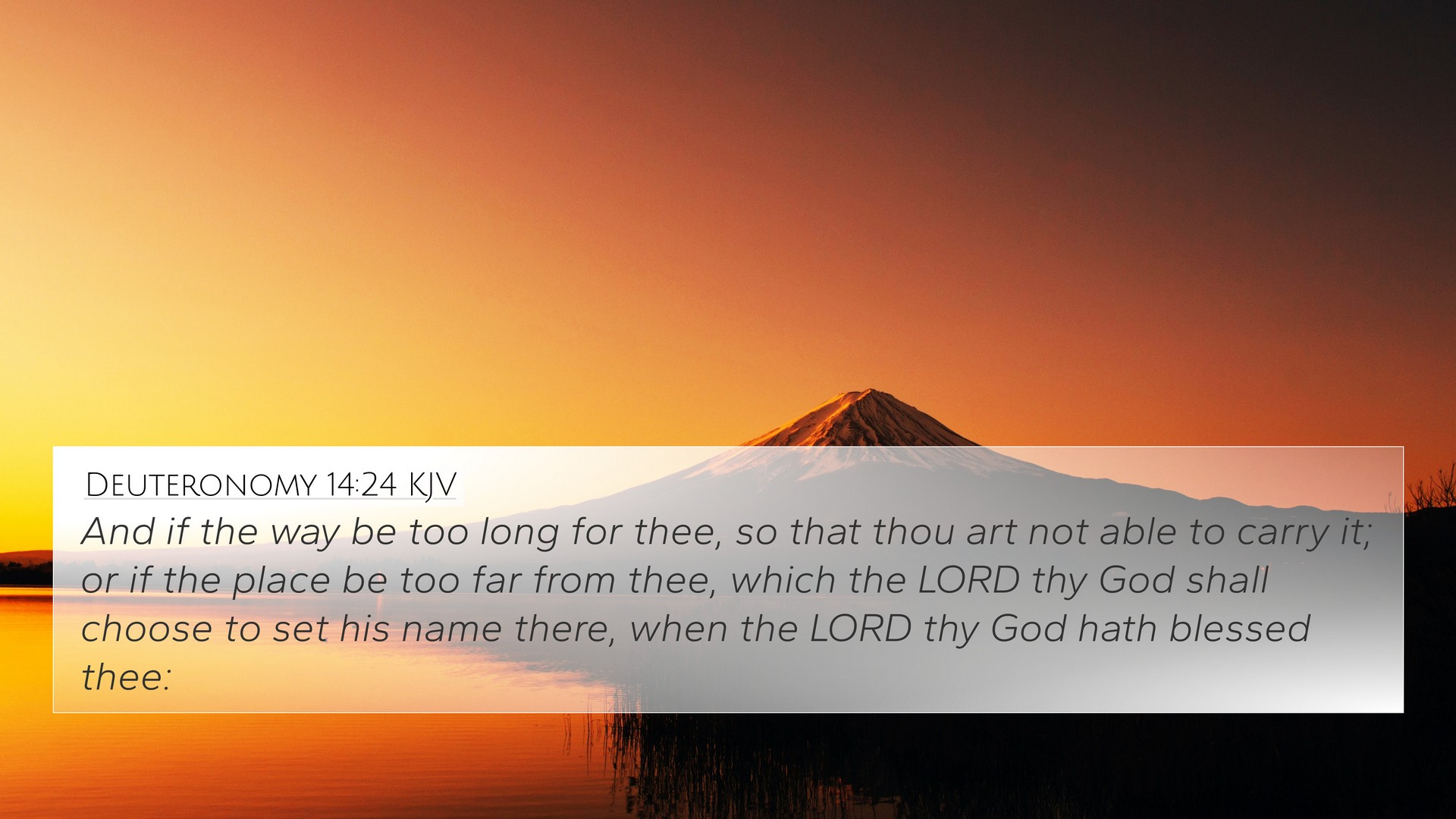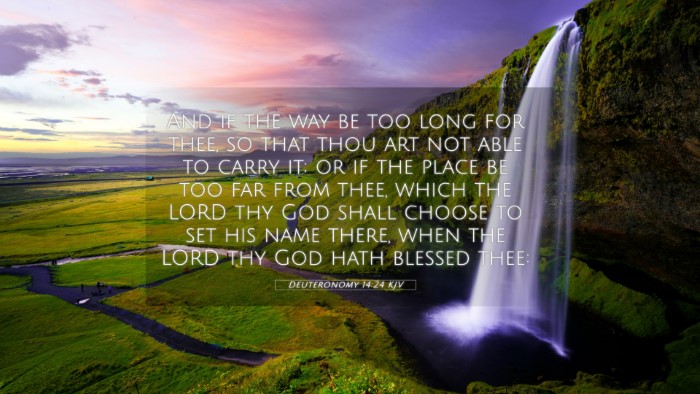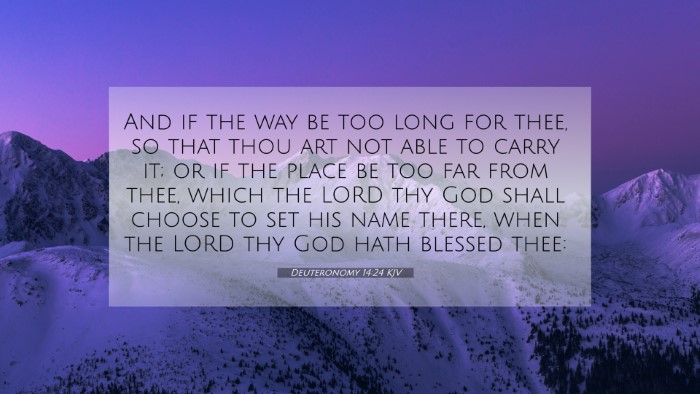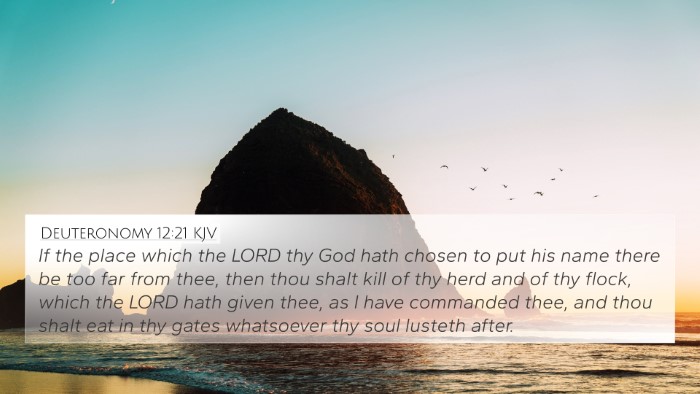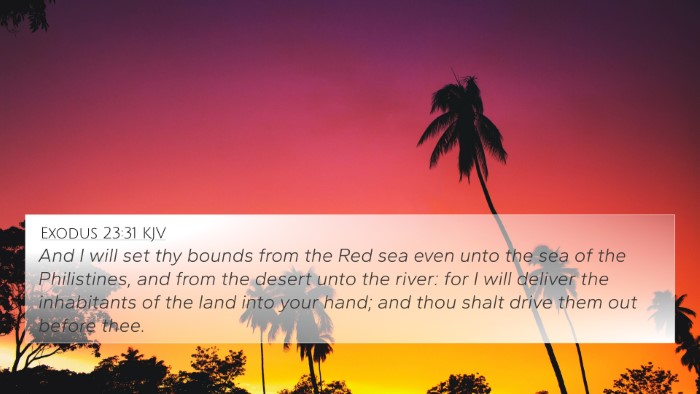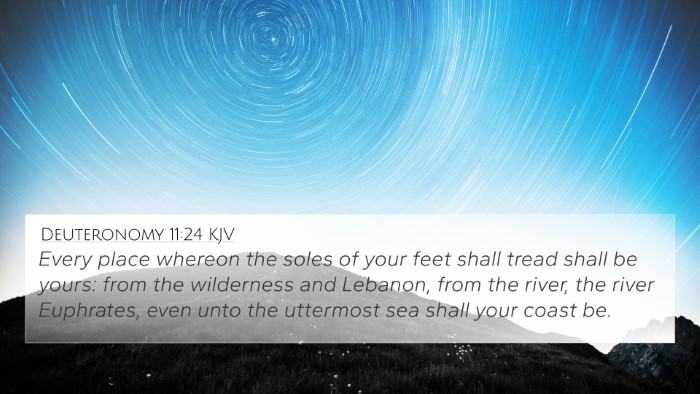Understanding Deuteronomy 14:24
Bible Verse: "And if the way be too long for thee, so that thou art not able to carry it; or if the place be too far from thee, which the Lord thy God shall choose to set his name there, when the Lord thy God hath blessed thee:" (Deuteronomy 14:24, KJV)
Overview of the Verse
Deuteronomy 14:24 addresses the logistics of fulfilling the divine command regarding offerings and tithes within the context of ancient Israel. It emphasizes God's understanding of human limitations with respect to travel and practical adherence to religious duties.
Commentary Insights
Insights from various public domain commentaries highlight the implications and practical applications of this verse:
-
Matthew Henry's Commentary:
Henry explains that God recognizes the challenges faced by His people in transporting offerings to the designated place of worship. This consideration emphasizes God's compassion and understanding of human circumstances. The verse implies that God desires genuine worship, not rituals hindered by logistical difficulties.
-
Albert Barnes' Notes:
Barnes elaborates on the distances involved and how it may not always be feasible to bring offerings to the central sanctuary. He underlines God's permissiveness in such matters, suggesting that when one cannot perform a duty due to distance, alternative means may be provided—indicative of God's grace in worship practices.
-
Adam Clarke's Commentary:
Clarke stresses the need for accessibility in worship and reflects on God's practical consideration in the command. He emphasizes that God desires heartfelt worship rather than mere compliance with sacrificial laws, thereby allowing flexibility to accommodate the worshipers' circumstances.
Thematic Connections
This verse resonates with several broader themes in the Bible regarding worship, obedience, and God's grace. It can be linked to various Bible verses that address similar concerns:
-
Exodus 23:18: Discusses the prohibition of offering the blood of sacrifices with leavened bread, connecting the theme of proper worship.
-
Malachi 1:8: Relates to the kinds of offerings that God requires, reinforcing the importance of sincerity in worship.
-
Matthew 5:23-24: Jesus emphasizes the importance of reconciliation and the heart behind the offerings, echoing the theme of sincerity in worship.
-
Isaiah 1:11-13: God expresses displeasure towards empty rituals, further demonstrating the need for genuine worship rather than mere compliance.
-
Luke 21:1-4: The story of the widow’s offering highlights that the heart of the giver is more important than the amount given.
-
1 Peter 2:5: Believers are seen as living stones offering spiritual sacrifices, tying in the theme of accessibility in worship.
-
Hebrews 10:24-25: Encourages believers not to forsake assembling together, capturing the spirit of community worship, which is accessible to all.
-
Romans 12:1: Calls for believers to present their bodies as living sacrifices, which emphasizes how worship extends beyond mere rituals.
-
Philippians 4:18: Discusses the idea of acceptable sacrifices to God, reinforcing the theme of offerings in worship.
-
John 4:24: "God is Spirit, and those who worship Him must worship in spirit and truth," indicating the heart's condition in worship, which echoes Deuteronomy 14:24’s emphasis on the intentions behind offerings.
Cross-Referencing Biblical Texts
This verse encourages cross-referencing other Biblical texts, providing deeper insights into the continuity of God’s message regarding worship across the Scriptures. Here are some tools and methods for effective cross-referencing:
- Bible Concordance: A useful tool for finding related verses based on specific keywords or themes.
- Bible Cross-Reference Guide: Offers insight into how verses interconnect and support one another.
- Cross-Reference Bible Study: Engaging in studies that focus on thematic connections can provide extensive understanding of Scriptures.
- Inter-Biblical Dialogue: Study discussions that articulate how Old and New Testament verses relate to one another can be enriching.
- Bible Chain References: Following a chain of linked verses that build upon a central theme enhances comprehension.
Conclusion
Deuteronomy 14:24 serves as a profound reminder of God's understanding and grace in our worship practices. By linking this verse to other Scriptures and employing cross-referencing tools, believers can gain meaningful insights into the way God desires to be worshiped—in spirit and in truth, while appreciating our human limitations.
